January 13, 2025
By Anahita Khojandi, PhD, Science & Technology Policy Fellow
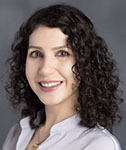
Anahita Khojandi, PhD, Science & Technology Policy Fellow
I am honored to have joined VA Health Systems Research (HSR) as a 2024-25 Science & Technology Policy Fellow, as part of the AAAS STPF Rapid Response Cohort in AI. Serving as a Fellow within HSR—and more broadly within the Office of Research and Development (ORD)—has given me the opportunity to deeply reflect on the research and development landscape.
My research tackles pressing societal issues related to medical decision-making, health equity, algorithmic bias, energy burden, and environmental and climate change challenges, among others. Over the past decade, I have led diverse interdisciplinary teams to harness the power of AI and provide valuable insights and solutions to stakeholders. However, I have recognized the need to scale this bottom-up approach for broader and lasting impact, prompting my interest in utilizing my expertise in AI and data science to inform policy development. Given the recent exponential advancements in AI technology and its pervasive integration into society, it is imperative to consider the broader implications of AI, recognizing its potential to generate societal benefits while also acknowledging its capacity to inflict harm. Hence, we must proactively devise strategies to ensure responsible AI use, raising awareness and implementing safeguards to guarantee that AI serves the collective well-being in the decades to come.
Over the past few months, I have gained a deeper understanding of ORD leadership’s vision and the diverse range of new and ongoing initiatives focused on leveraging AI to improve the quality and efficiency of care delivery in VA. The shared vision, combined with the contagious enthusiasm of every individual I have had the privilege to engage with, has inspired me to develop new research ideas, actively contribute to discussions, and apply my skills and expertise to support the efforts to create a positive and meaningful impact.
My interactions with colleagues and leadership at HSR, as well as across ORD, have provided me with a valuable perspective—a chance to pause and take a 30,000-foot view of our current position and future directions. These experiences have enhanced my understanding of the critical importance of aligning research with the core mission of the agency. Moreover, witnessing the unwavering dedication of the staff and leadership to making a positive impact on the lives of our Veterans has profoundly shaped my perspective on the role and potential of research and development.
Dr. Khojandi is an associate professor in the Department of Industrial and Systems Engineering and Heath Endowed Faculty Fellow in Business and Engineering at the University of Tennessee-Knoxville. She received her PhD in Industrial Engineering from the University of Pittsburgh. Her research interests include decision making under uncertainty and partial information, machine learning, and reinforcement learning, with applications in a wide range of areas, particularly health and genomics. Her research is supported by the National Science Foundation, National Institutes of Health, and Department of Energy, among others. In 2023, she was awarded the NIH’s Artificial Intelligence/Machine Learning Consortium to Advance Health Equity and Researcher Diversity Fellowship in Leadership. She currently serves as the Vice President of Membership and Professional Recognition and has previously served as the chair of Diversity, Equity, and Inclusion Committee at INFORMS—the largest professional association for the decision and data sciences.
December 17, 2024
By Matt Boehm, PhD, AAAS Fellow

Matt Boehm, PhD, AAAS Fellow
I’m excited to join VA Research in Health Systems Research (HSR) as one of the incoming fellows through the American Association for the Advancement of Science’s Science and Technology Policy Fellowship. Before coming to VA, I earned a PhD in neuroscience from Brown University in a partnership program with the National Institutes of Health (NIH). While at the NIH, I performed neuroimaging research at the National Institute on Drug Abuse (NIDA) and volunteered in the NIDA Office of Science Policy and Communications working on topics related to cannabis and psychedelics. I also taught biology courses at University of Maryland Global Campus and had the pleasure of working with Veterans and active-duty military students. I’m now applying my background in neuroscience, mental health, and substance use disorders in efforts to improve VA research and healthcare.
My work within VA spans the HSR and Brain, Behavior, & Mental Health broad portfolios. I currently support HSR4—the scientific review group covering research focused on mental and behavioral health (e.g., PTSD, anxiety, depression, serious mental illness, suicide prevention, substance use disorders) with use of learning health systems methods (i.e., implementation, engagement, policy, systems and/or data science). It’s rewarding to work with researchers studying treatments for mental health and substance use disorders at the health systems level because there is such a great opportunity for Veteran-centered research impacts. In addition, much of the knowledge and lessons learned from this research can be applied to improve our health systems more broadly.
One topic area I’m excited to be involved in is VA’s research efforts related to psychedelic treatments for mental health and substance use disorders. In 2024, VA released a Notice of Special Interest for research applications to study the use of MDMA (3,4-methylenedioxymethamphetamine) or psilocybin as treatments for PTSD or depression. Both types of treatments have received “Breakthrough Therapy” designations by the FDA, which is an expedited review process for drugs that treat a serious condition and show preliminary clinical evidence for substantial improvement over currently available treatments. However, both MDMA and psilocybin remain classified as Schedule I drugs at the federal level (i.e., strictest regulatory category with high risk for abuse/harm and no accepted medical use) as neither treatment has yet received final FDA approval. VA can play an important role in funding research to address current knowledge gaps, optimize safety and efficacy, and advance progress for Veterans who could greatly benefit from improved treatment options for mental health and substance use disorders. It’s exciting to see growing interest in this area, such as the recent press release announcing VA will be funding a study to evaluate the potential of MDMA-assisted therapy as a treatment in Veterans with both PTSD and alcohol use disorder.
Another area I’m excited to be involved in is supporting the aging related research initiatives within VA research. This includes the Aging Research Integration Workgroup, which is a multidisciplinary group established for the purpose of linking different scientific disciplines (i.e., biomedical, clinical, rehabilitation, genomic, health systems, data science, and others) to facilitate translation and implementation of evidence to improve care for aging Veterans. I’m also helping coordinate a VA State of the Art conference on Age-Friendly Health Systems. It’s rewarding to work with a large group of experts who are dedicated to improving care for older Veterans and the aging population in our health systems. I’m looking forward to the impactful work ahead and wish everyone happy holidays!
November 22, 2024
By Anna Kasdan, PhD

Anna Kasdan, PhD
I am thrilled to have joined Health Systems Research (HSR) as an American Association for the Advancement of Sciences (AAAS) Science and Technology Policy Fellow. Most recently, I came from Vanderbilt University where I completed my PhD in Neuroscience followed by a postdoctoral position in the Department of Hearing and Speech Sciences. In my research, I worked closely with individuals with aphasia—a communication disorder due to damage to language regions of the brain—and their loved ones in both research and community settings. In this work, I came to understand the challenges patients and their loved ones face in real-world settings, and how policies at the federal level could impact quality of life. I was drawn to HSR’s strong commitment to improving the health and healthcare of Veterans through translation and implementation of research, always focusing on the end-users. I am excited to apply my experiences in patient-focused research to the policy arena. Thus far, I am involved in projects in three unique areas.
First, I have been working on VA’s response to the White House Executive Order (EO) on Women’s Health Research. I have long been interested in women’s health and am fortunate that these efforts have been a substantial part of my fellowship. As part of VA’s response, I have updated definitions of sex and gender in Office of Research and Development (ORD) reference guides—working across the ORD enterprise to do so—and collaborated with the ORD Communications team to produce a public-facing article about the EO. I am also actively participating in interagency collaborations with the Department of Defense and National Institutes of Health (NIH). I am most excited about operationalizing a new planned collaboration with the NIH Building Interdisciplinary Research Careers in Women’s Health (BIRCWH) program to involve more early-career investigators in research specifically focused on the unique needs of women Veterans.
Second, I am spearheading the first ever survey of VA field investigators’ attitudes and perspectives on the peer review process. The goal is to learn how VA Central Office can best support investigators and ensure their success in research and in their careers overall. Given VA is an intramural agency, it is uniquely positioned to streamline the process of peer review so that investigators can produce timely, cutting-edge science in response to critical health issues that ultimately affect the lives of our Veterans. My goal is to design a survey tool that is scalable and flexible so that it may be used in the future, beyond my time in the fellowship. I am excited to collaborate with leads and scientific program managers across all Broad Portfolios (BPs) and Actively Managed Portfolios (AMPs) to learn deeply about the peer review process and hopefully make actionable changes based on input from the field.
Last, one of the reasons I was most excited to come to HSR is because of its deep commitment to the Veteran Quintuple Aim goals using learning health systems methods, including engagement science. With my background in working with individuals with brain injury, I am looking forward to collaborating with the traumatic brain injury (TBI) AMP in thinking about ways that end users—Veterans, their loved ones, and providers—can be engaged in the research lifecycle. Veterans and their loved ones deserve to have a voice in the research being done for and about them and I am thrilled that I get to do this work as part of my fellowship.
October 16, 2024
By Olalekan Ogunsakin, MD, PhD, MBA, MPH
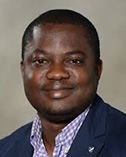
Olalekan Ogunsakin, MD, PhD, MBA, MPH
I hope you are having a nice end of the fall season as we gradually transition to the holiday season and its beautiful cool weather. I am excited to be one of the AAAS STPF Fellows at VA HSR. As someone who has spent so much time on the basic biomedical sciences, it gives me great pleasure transitioning into the implementation and policy arena through my fellowship experience at HSR, specifically working with the QUERI team. I’m hoping to contribute and support change and innovation within the following areas.
Streamlining Criteria and Review Processes for Funding and Interventions. Thus far, I have had the privilege of working closely with the QUERI team, and have immersed and familiarized myself with learning the various QUERI Standard Operating Procedures (SOPs), with an additional overarching focus on streamlining and improving the effectiveness of the criteria and review processes for non-research funding proposals submitted to QUERI. QUERI, at the forefront of implementation science, evaluation methods, and knowledge translation, requires a periodic evaluation process that is both rigorous and efficient. My goal is to work assiduously with the team towards improving existing frameworks that balance the need for evidence-based assessments and practices that are relevant to Veterans’ needs.
Developing Systems and Metrics to Measure Implementation Impact on Veterans’ Health. During my fellowship, I’ll also focus on improving some of the system metrics designed to measure implementation impact and the successes of the Centers of Innovation (COINs). Working with the QUERI team, my goal is to contribute towards improving parameters that allow for a more precise evaluation of how COIN research affects Veterans' health. These factors include metrics on patient outcomes, the adoption of best practices, and the scalability of innovative solutions across the VA healthcare system.
Pain, Opioid, and SUD Management and Interventions among Veterans. My prior work on expanding substance use disorders (SUD) curriculum in medical institutions and mitigating stigma among patients with SUD has taught me the importance of a multifaceted approach—one that combines prevention, treatment, and long-term care. In working with the HSR’s Pain and Opioid Consortium of Research, I hope to discuss this perspective with other stakeholders and leadership, ensuring that the programs we implement are sustainable and patient-centered, ultimately reducing opioid dependence and improving Veterans’ quality of life.
Translational Shift from Basic Sciences Research to Policy Formulation on Veterans’ Health.
A key motivation throughout my career has been the desire to bridge the gap between basic science research and policy formulation. Far too often, innovative scientific discoveries fail to reach the policy arena where they can make a real difference in people's lives. Through my work with QUERI, I see an opportunity to apply implementation science to this challenge, translating scientific advancements into practical healthcare solutions for Veterans. One of my long-term goals is to help shape policies that not only improve treatment options but also foster a more adaptive and resilient healthcare system. By leveraging the insights gained from my fellowship experience with HSR and QUERI, I hope our efforts will contribute to policies that enhance and improve healthcare delivery to Veterans.
July 18, 2024
By Lolita Kachay, MPH, Health Science Specialist
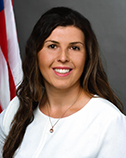
Lolita Kachay, MPH, Health Science Specialist
July marks two months since I started my career at VA within Health Systems Research (HSR). In a such a short period of time I’ve already met and collaborated with many different groups of experts across the VA both in Central Office and the field. As I’ve interacted with new colleagues, I’m impressed by the reach HSR and ORD have and the involvement of different facets of VA to make a project successful. Through the wide range of clinical care that HSR programs touch, I see the potential impact HSR-funded research and programs can have both within the VA and across government.
Prior to joining VA, I spent eight years at the Office of the National Coordinator (ONC) for Health IT within the Department for Health and Human Services (HHS). My work at ONC focused on collaborating with federal partners and the health IT community in overseeing health IT implementation projects. These projects aimed to improve interoperability and exchange of electronic health data so healthcare providers and patients have the information they need to help inform decision-making at the point-of-care. One of the main projects I managed was overseeing implementation pilots of health IT solutions for opioid use disorder and substance use disorder. Specifically, in collaboration with CDC colleagues, overseeing the implementation of CDC’s Clinical Practice Guideline for Prescribing Opioids for Pain into computable, electronic clinical decision-support intervention tools to be used in EHRs, as well as advancing prescription drug monitoring programs (PDMPs) integrations with health IT systems within several states.
During my career at HHS, in addition to the rewarding work, I had the privilege to work alongside intelligent and passionate colleagues as well as experts across the digital health industry. I’m happy the same is true in my role at VA. Even though I have only been here for two months so far, I have met many colleagues within ORD—as well as investigators in the field—and see the impact their work has on improving care delivery and the health of Veterans. I’ve already had the opportunity to make contributions across various areas of my work, specifically women’s health initiatives related to directives in the White House Executive Order on Advancing Women’s Health Research and Innovation. I feel fortunate to continue my federal career and engage with experts in the field, as well as across VA and the federal government, to support the important work and continue to make contributions to advance the nation’s largest integrated health system.
June 17, 2024
By Amy Kilbourne, PhD, MPH, Acting Director of HSR
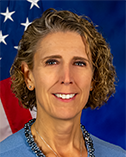
Amy Kilbourne, PhD, MPH, Acting Director of HSR
It’s that time of year again: graduation parties, send-offs to summer camps, better parking (if you live near a university), and hopefully the opportunity to take some well-deserved time off. After carefully curating the annual summer reading list, my aspirations were quickly dashed by a backlog of journal paper revise-and-resubmits (which always seem to arrive right before summer break).
This summer our HSR Scientific Staff team in ORD is also working hard to better streamline our investigator-initiated requests for applications and peer-review processes, under our newly reorganized ISRM (Investigators, Scientific Review, and Management) group. Their work is inspirational: many thanks to Tiffin, Cathie, Amanda, Bob, Crystal, Chanel, Amelia, Kara, Christine, and Bonnie for going above and beyond to make the application process more straightforward for our investigators. As much of the ORD Enterprise Transformation draws upon the experiences of QUERI and HSR, notably learning health system-focused partnered research, data infrastructure, and real-world impacts, the HSR scientific team has worked with their ORD colleagues to help create more opportunities for our investigators to apply for funding across the translational spectrum, ensuring “no wrong door” when an application transcends clinical/health systems/rehabilitation topic boundaries. This is crucial as our investigators are increasingly innovating in learning health system methods, especially in emerging areas such as military exposures, traumatic brain injury, social determinants of health, precision health, and artificial intelligence.
By summer we expect to have new cross-disciplinary RFAs with a pre-application process that enables investigators to request their study section and highlight how their proposal is responsive to ORD priorities through Notices of Special Interest. These cross-portfolio RFAs emphasize core HSR concepts such as end-user engagement and implementation planning across the translational spectrum, and HSR continues to invest in VA national priority-focused research that achieves Veteran Quintuple Aim goals (improved access, equity, outcomes, experience, value) using foundational learning health system methods (implementation, data, engagement, systems, policy science). To further build capacity in these emerging areas, we are also expanding the number of Centers of Innovation (COINs), Consortia of Research (COREs), and QUERI Learning Health System Data Science initiatives, encompassing new ORD, VISN, and national operational partners and enhancing enterprise-wide data capacity, governance, and translational science impacts. Finally, we expect to learn valuable insights from our FY26-30 HSR/QUERI strategic planning process and continue to learn best practices from our colleagues across ORD and beyond to improve the way we can support our investigators especially in this challenging, but hopefully cyclical funding period.
So have a relaxing and rejuvenating summer- we hope to see you at AcademyHealth (which has a heavy VA presence as always) and thank you again for the innovation and impact you are making towards improving Veteran care!
April 22, 2024
By Alex Meredith, PharmD, AAAS Fellow

Alex Meredith, PharmD, AAAS Fellow
As a pharmacist, I have witnessed first-hand the effect that impactful healthcare programs and policies have on patients. My upbringing in Kentucky—a state with one of the highest poverty rates in the nation—deeply influenced my career path. My interest in developing and tailoring programs to help people was more fully entrenched during my graduate program, where I led the pharmacy team in the foundational development of pharmacy services at a new student-run free clinic for the underserved, and also coordinated pharmacy services at free primary care clinics and homeless shelters in Cincinnati, Ohio.
Primary prevention is an essential task of pharmacists. Typically seen in the traditional roles of a retail pharmacy or hospital setting—and consistently viewed as one of the last stops before the patient leaves a healthcare setting—pharmacists take an active role in public health through effective clinical medication management and health education. Before joining HSR as an AAAS fellow, I was unaware of the many other avenues through which pharmacists can make an impact from other than behind the counter. Working in HSR has allowed me to expand my public health impact by furthering evidence-based policy and practice via the housing and economic insecurity initiative. I hope to continue that impact by working with VA’s Psychedelic Medicine Integrated Project Team to plan the evaluation of psychedelic medicine delivered as part of VA clinical care. In addition, working in VA has allowed me to look at larger-scale public health efforts. While successful at times, these efforts face responsiveness and sustainability challenges, and often fall short at fully tackling a problem at the point-in-time. With thousands of Veterans still homeless or economically insecure, VA’s use of a Learning Health System approach—implementing a national evaluation of Veteran experiences, risk, and resilience factors throughout the entirety of their lives—can inform both new and existing programs to work better on behalf of Veterans. This approach ultimately hopes to answer the questions: How do Veterans become homeless? How can we prevent these crises in the first place?
Working in HSR has been a wonderful experience. I am awestruck by the dedication and determination to better the lives of those who served our country and am excited to continue working alongside these incredible individuals to translate research into practice and inform policies and programs to improve Veterans’ health and outcomes.
March 12, 2024
By Nicholas Bowersox, PhD
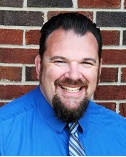
Nicholas Bowersox, PhD
VA is preparing its Fiscal Year 2026-2030 Strategic Plan. The VA Strategic Plan (SP) is intended to inform management efforts across the Veterans Health Administration (VHA), Veterans Benefits Administration (VBA), and National Cemetery Service (NCS) to ensure that these aspects of VA are unified in supporting a common vision in supporting Veterans, their families, caregivers, and survivors. The Strategic Plan also sets the stage for VA’s efforts to support resource sharing across Federal departments and agencies. It’s estimated that the next Strategic Plan will guide the use of approximately $1 trillion in government funds over the coming decade through various programs designed to support Veterans.
The process of creating the next SP is being led by the Office of Enterprise Integration, and includes workload contributions by VA personnel across multiple workgroups and offices. The first step in this development process consists of a rapid foundational analysis that has been designed to synthesize information from multiple sources: interviews with Veterans; interviews with VA leadership; surveys of VA employees; reviews of VA policy and evaluation documents; and reviews of relevant literature. This foundational analysis will result in the creation of summary documents that will be shared and refined with senior VA leaders to create the final SP. The process began November 2023 and is expected to continue through September 2025, with the initial rapid foundational analysis being completed by April of this year.
The Quality Enhancement Research Initiative’s Center for Evaluation and Implementation Resources (CEIR) is conducting a rapid evaluation project to generate information related to multiple aspects of the SP’s foundational analysis. These include: interview sessions with Veteran key informants; interview sessions with VA leadership; and review of relevant literature. The most relevant aspect of this project for the VA research community is CEIR’s interviews with Veterans, who were recruited from VA HSR Centers of Innovation (COIN) Veteran Engagement Panels (VEPs). VEPs are made up of Veteran representatives who have agreed to offer their feedback on VA research projects and are consulted regularly by research teams within COINs. CEIR has reached out to all COIN-affiliated VEPs, with the majority of VEPs agreeing to participate in one-hour virtual group interview sessions. These interview sessions focus on topics such as:
The COIN VEPs will play an essential role in this evaluation process, as it would not be feasible to otherwise identify, organize, and contact groups of Veterans for inclusion in this evaluation given the very short timeline (2-3 months for primary data collection). As such, without COIN VEP participation in this process, Veterans’ voices would almost certainly not be included in the creation of the next Strategic Plan. Given VA’s focus on meeting emerging Veteran needs—such as engaging with Veterans who are not VA patients; addressing persistent Veteran challenges such as homelessness and suicide; and responding to the needs of a rapidly-changing Veteran population—it is essential that VA is able to include Veterans in this planning process to better understand their concerns, needs, and hopes for the future of VA. Such inclusion sends a strong signal that Veterans serve not just as research subjects to inform such planning, but active partners in helping to shape the future of VA.
February 9, 2024
By Corinne Voils, PhD

Corinne Voils, PhD
As a first-generation college student, I never had a clear path to follow. I applied to two universities, both chosen based on where my friends wanted to go. Little did I know that one of those was an expensive, private university whose annual cost was equivalent to my father’s salary. When that university held an information session in my city and my mom inquired about scholarships, we were told, “The financial aid deadline was yesterday.” We didn’t know what financial aid was, or that there was a deadline. That sealed my fate: I had to attend the only other university I had applied to, and I needed to apply for aid.
I didn’t realize until well into my adult life how being a first-generation student affected my approach to undergraduate and graduate college admissions, educational experience, and career. As an undergraduate, I knew that I wanted to go to graduate school, but I had no idea how to get there. An acquaintance was a member of the psychology honors society and urged me to join since I was a psychology major and had a good grade point average. Through that organization, I learned about an opportunity to do research with a faculty member. I started working with Dr. Michael Zarate, who let me run subjects and advised me on applying to graduate school. Unfortunately, I didn’t listen to all his advice. I didn’t study for the GRE because I didn’t think it was possible to improve my score; either you had it, or you didn’t. My score was okay, but not enough to get into the top graduate programs in my field. Against his advice, I only applied to those top programs the first time around and was not admitted. The next year, I listened to him and developed a more balanced list. I was admitted to two programs. When I see him today at conferences, he laughs and tells people, “She applied to X (highly distinguished) program as her back-up school. It was her back-up because she didn’t want to live there.”
While funny, this anecdote shows just how lost someone can be as a first-generation college student. I feel very fortunate to have been presented with mentorship and opportunities that set me down a productive path. One such opportunity was a postdoctoral fellowship at the Durham Veterans Affairs Medical Center (VAMC). In graduate school, I became disillusioned with academia because my professors did not seem to have work-life balance and undergraduates only seemed to care about grades. Through a professor, I found a job at a small consulting firm that analyzed quality of life and medication adherence data from pharmaceutical trials. Business did not do well following the September 2001 attacks, forcing me to look for another position. Through the same professor, I was connected to Dr. Hayden Bosworth at the Durham VAMC. He had a slot open for a postdoc position. I did not know what health services research was or what I would do after the postdoc. But I was familiar with Veterans and their healthcare struggles because my father had served in the Navy during Vietnam. I had heard many interesting stories about his military experience, and I had often tried to persuade him to stop smoking and to lose weight. During my postdoc, I learned that my background as a social psychologist could be used to develop behavioral interventions to help Veterans make and sustain lifestyle changes. Hayden guided me to develop collaborations with clinicians to ensure I was doing clinically relevant work; told me to trust my gut; and helped me prepare a successful application for the Merit Review Entry Program career development award available for non-clinicians at that time. Through his mentorship as well as that of Drs. Gene Oddone and Morris Weinberger, I started down a career path that I didn’t know existed.
As we know in health services research, sometimes we can change structures to help a lot of people; other times, we must help individuals navigate a suboptimal system. As a mentor, I recruit lab members from university organizations that serve students from underrepresented backgrounds. Even though they made it to college, I see that my students from more privileged backgrounds have an easier time figuring things out. First-generation students need guidance in identifying and creating paths they don’t yet know exist. When I think about what mark I want to leave, it is undoubtedly paying it forward.
January 18, 2024
By Maren Loe, PhD

Maren Loe, PhD
I was honored to join Health Systems Research (HSR) in mid-September 2023, as part of the 51st cohort of the American Association for the Advancement of Sciences (AAAS) Science and Technology Policy Fellowship (STPF). I spent the previous seven years in the combined MD/PhD Medical Scientist Training Program at Washington University in St. Louis. Having completed my PhD in Systems Science and Mathematics, I will return to complete my MD program in 2025. As a physician-scientist in training, I faced various obstacles in my research, some of which resulted from a lack of a unified infrastructure to facilitate the translation of clinical data into knowledge and practice behaviors. When I defended my dissertation, my PhD advisor estimated that it would take at least a decade for my work to change clinical practice. The literature suggests that is an optimistic timeline, and that the so-called “implementation gap” is closer to 17 years from bench to widespread implementation at the bedside. Here in HSR, reducing that gap is within our purview, as are some of the other structural challenges I faced. My job now includes considering questions like how we are using medical data to improve Veterans’ health through a Learning Health System.
Specifically, one of my projects this year is updating our priorities in informatics research, which is being dramatically impacted by the recent explosion of artificial intelligence research, specifically generative AI and large language models (LLMs). These tools hold great promise to improve clinical care through better treatments and interventions as well as for workforce support. As a medical trainee, I saw how time-intensive documentation—like writing insurance appeals letters against prior authorization denials—could take time away from the humanistic side of medical care. I watched many attending and resident physicians spend a large proportion of their time behind a computer, facing a tradeoff between charting during the outpatient visits to save time or working late to finish charts after the patients left. LLMs have already been proposed as a tool to reduce some of this burden of documentation, and start-ups have already begun creating software for electronic health records, while some clinicians have described using ChatGPT to write basic insurance appeal letters.
In this arena, HSR aims to understand questions of appropriateness, safety, and reliability. For example: When the use of a given tool is appropriate, what implementation strategy is best? How can that tool be used to promote patient safety while avoiding any adverse events? As a science and technology policy fellow, it has been fascinating to watch HSR and the National Artificial Intelligence Institute interpret and implement guidance from the White House (Executive Order). I have a front row seat to the creation and implementation of policy that will inform patient care and research that improves Veterans’ lives. I am excited to continue my work in this domain throughout the rest of my fellowship year here at HSR.